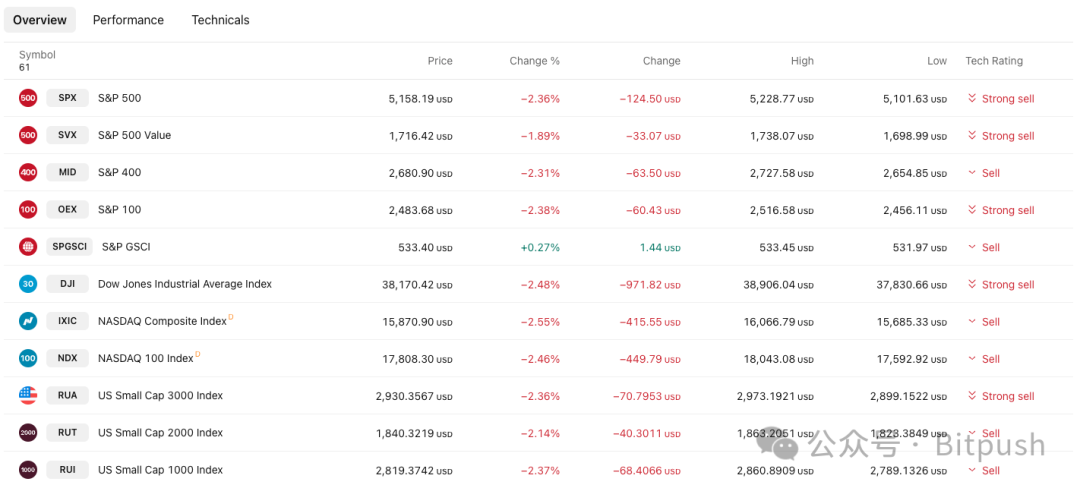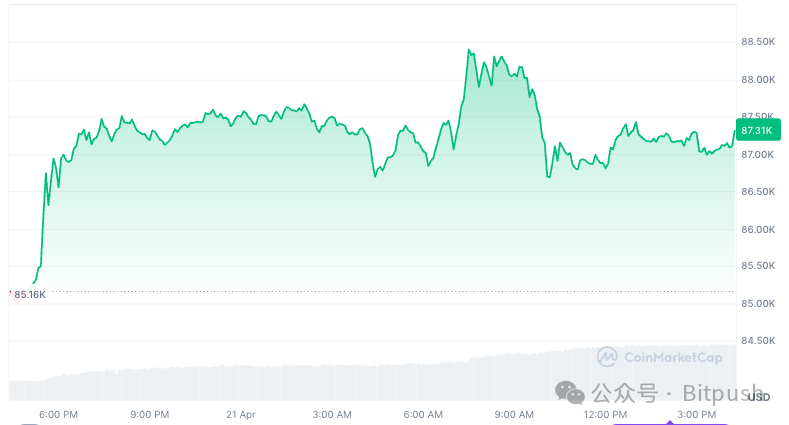Author: BitpushNews Mary Liu
As the market worries that U.S. President Donald Trump may follow through on his threat to fire Federal Reserve Chairman Jerome Powell and implement policies that could lead to an economic recession, a wave of "selling U.S. assets" is unfolding.
Data shows that the S&P 500 index plummeted 2.7% on Monday to 5142.18 points, down 13% from the beginning of the year and 16% from recent highs; the Dow Jones Industrial Average fell by 972 points, a decrease of 2.5%; the Nasdaq Composite Index has even entered bear market territory, down 21% from its peak.
The bond market is equally grim, with the 10-year U.S. Treasury yield rising 7 basis points to 4.41%, and the 30-year yield jumping 10 basis points to 4.91%. In the currency market, the dollar index fell 0.9%, depreciating more than 5% against the euro and yen, hitting a three-year low.

Investors are struggling to cope with the risk of Powell potentially being dismissed (the White House indicated last week that it is evaluating this matter) and the potential impact of Trump's policies on the world's largest economy, leading to a retreat from U.S. safe-haven assets. Coupled with broader risk-averse sentiment, gold surged to a historic high on Monday, and cryptocurrencies also saw gains, with Bitcoin reaching $88,000 for the first time since March.

Recession + Concerns Over Fed Independence = Adding Insult to Injury
"At a time when the current government has injected increasing levels of uncertainty into the economic outlook, any attempt to replace Powell will exacerbate the downward pressure on U.S. assets," said Ian Lyngen, head of U.S. interest rate strategy at BMO Capital Markets.
On Monday, Trump again called for the Federal Reserve to cut interest rates via Truth Social, stating, "Many are calling for 'preemptive rate cuts.'"
Although legal scholars suggest that Trump would find it difficult to easily fire the Fed chairman, and Powell has stated he would not resign if asked by Trump, the speculation still brings new blows to U.S. assets. Washington's aggressive trade tariffs have already sparked concerns about a U.S. economic recession and intensified doubts about the status of U.S. Treasuries as the preferred safe-haven asset.
Multiple risks are heightening market concerns about economic growth and inflation paths—and how the Fed will balance both. While traders expect the Fed to cut rates at least three times this year, former New York Fed President Bill Dudley wrote in a Bloomberg opinion column that policymakers' actions may be slower than expected.
The Bloomberg Dollar Spot Index fell 1% on Monday, reaching its lowest level since the end of 2023, before slightly narrowing its losses. The yen rose to its highest level since September last year, while the euro surged to its highest point in over three years.
The euro is currently trading around $1.15, close to the most optimistic year-end forecast level from strategists. Bloomberg data shows the yen to dollar exchange rate at approximately 140.50, stronger than the median year-end forecast of 143.
"Trump's comments about possibly firing Fed Chairman Powell, even if these ideas do not materialize, pose a significant threat to the Fed's independence in the eyes of the international community, thereby threatening the dollar's status as a safe-haven currency," said Monex forex trader Helen Given.
"If the U.S. economy falls into recession and the central bank cannot or does not act independently, this recession could worsen, bringing more concerns to the market," she added.
Traders in the options market have reached the highest level of bearish sentiment on the dollar since the Covid outbreak. The premium paid to hedge against the risk of the dollar falling against a basket of currencies over the next year (relative to bets on rising) has reached its highest level since March 2020.
The sell-off on Monday intensified after Kevin Hassett, director of the National Economic Council, stated on Friday that Trump is looking into this matter. According to informed traders, several hedge funds joined the dollar sell-off on Monday after Hassett's remarks. These traders requested anonymity as they are not authorized to speak publicly on the matter.
Data from the Commodity Futures Trading Commission shows that hedge funds' bullish sentiment on the dollar has fallen to its lowest level since October last year. While headlines about Powell have indeed not helped market sentiment, others suggest that the deteriorating global trade war may continue to dominate dollar trading.
"Central bank independence is so precious—it is not something to be taken for granted, and once lost, it is hard to regain," said Will Compernolle, a macro strategist at FHN Financial in Chicago. "Trump's threats against Powell do not help foreign investors' confidence in U.S. assets, but I still believe that tariff news is the main driver," he said.
The extra yield required for investors to hold 30-year Treasuries instead of 2-year Treasuries has risen for nine consecutive weeks, marking only the second time this has occurred since Bloomberg began compiling this data in 1992. In early trading on Monday, strong demand through block trades in 2-year futures further pushed the trend of a steepening yield curve.
Short Dollar, Long Gold and Bitcoin
As Trump's trade war undermines U.S. economic growth and profit prospects, warnings from Wall Street stock strategists are increasing.
Citigroup strategists downgraded their outlook on U.S. stocks last week, stating that the cracks in "American exceptionalism" will persist. They joined the ranks of institutions like Bank of America and BlackRock, which have recently turned bearish on U.S. stocks.
"The latest catalyst for the dollar sell-off may be the pressure on Powell, but the reality is that the dollar sell-off no longer needs more reasons," said Gareth Berry, a strategist at Macquarie in Singapore. "Everything that has happened over the past three months has provided enough justification for a sustained dollar sell-off, which could last for months."
Meanwhile, Lawrence McDonald, former head of U.S. macro strategy at Industrial Bank, stated that now may be the time to sell gold and buy Bitcoin.
He commented on X, "With the volatility index (VIX) close to 30, Bitcoin has never performed so well. This is a strong signal of the Bitcoin market maturing (good news) and a powerful testament to the immense pressure facing fiat currencies like the dollar."
免责声明:本文章仅代表作者个人观点,不代表本平台的立场和观点。本文章仅供信息分享,不构成对任何人的任何投资建议。用户与作者之间的任何争议,与本平台无关。如网页中刊载的文章或图片涉及侵权,请提供相关的权利证明和身份证明发送邮件到support@aicoin.com,本平台相关工作人员将会进行核查。




